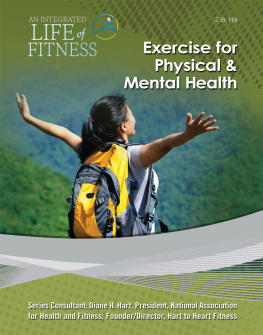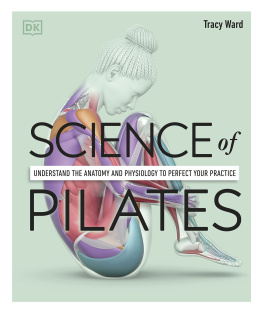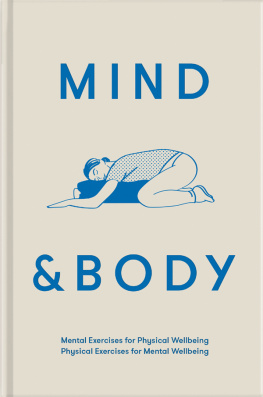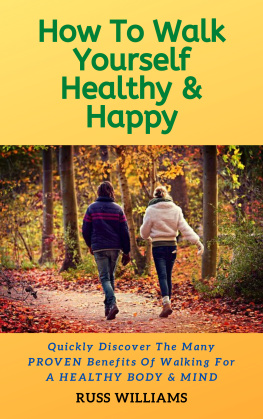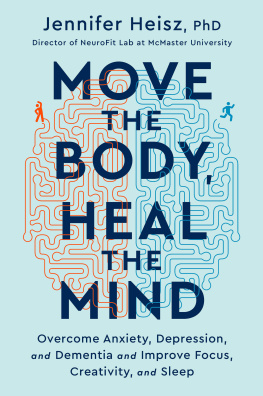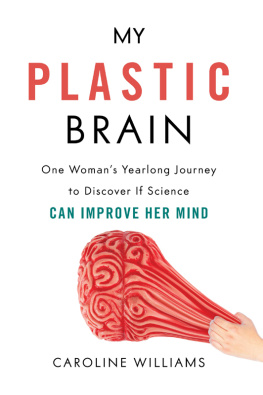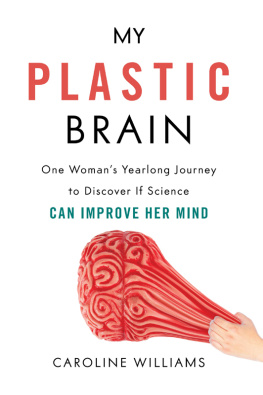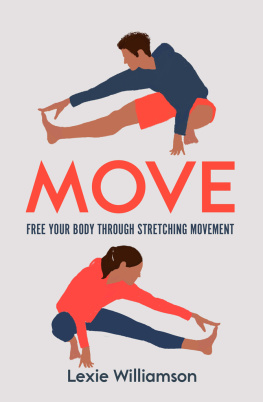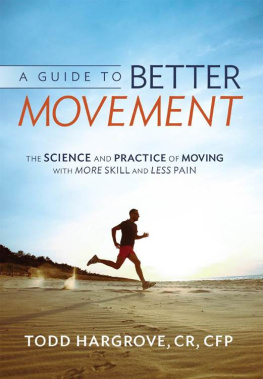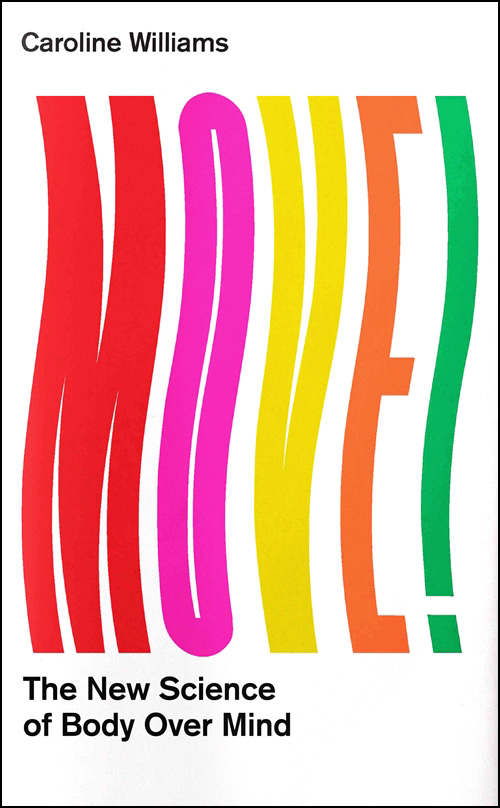Contents
Guide
MOVE!
Also by Caroline Williams
Override
MOVE!
The New Science of Body Over Mind
CAROLINE WILLIAMS

First published in Great Britain in 2021 by
Profile Books Ltd
29 Cloth Fair
London
EC1A 7JQ
www.profilebooks.com
Copyright Caroline Williams, 2021
The moral right of the author has been asserted.
All rights reserved. Without limiting the rights under copyright reserved above, no part of this publication may be reproduced, stored or introduced into a retrieval system, or transmitted, in any form or by any means (electronic, mechanical, photocopying, recording or otherwise), without the prior written permission of both the copyright owner and the publisher of this book.
A CIP catalogue record for this book is available from the British Library.
ISBN 9781788164610
Export ISBN 9781788167284
eISBN 9781782836629
Audio ISBN 9781782838463
For Jon and Sam,
who keep me moving
Introduction
Just come in and move however your body wants to
This is the moment I have been dreading all day. Its 7.30 p.m. on a Wednesday and I have come to a village hall in Surrey, England, for what Ive been told will be an evening of mind-altering free-form dance.
The young man on the door takes my money and encourages me inside. Its dark, apart from a few candles and fairy lights, but I can just make out a middle-aged DJ with a bleached crew cut and harem pants, spinning what probably comes under the banner of gentle tribal beats. One woman is rolling on the floor, while another is wafting around chasing imaginary butterflies. Then two of them start hugging. At which point my body tells me very clearly that it would like to move, as quickly as possible, back through the door.
I dont, and as the evening progresses, my body gives up the fight and starts to move. As the drums build towards a climax, the DJ murmurs let go into the mic. Suddenly, as if he flicked a switch, I notice that Im no longer moving my legs: they are moving me. My feet are hammering the floor at an alarming rate, as my head shakes from side to side and my arms flail in circles. I couldnt stop if I wanted to, and I feel unleashed, alive, free.
It was my first foray into the world of how movement can radically affect the mind, and it was something of an eye-opener. Ill be honest: getting high on life like this isnt my usual kind of thing at all. My thing is more about sitting quietly, reading, thinking and writing about the peculiarities of the human mind trying to get my head around why people think the way we do, and what science can tell us about how we might overcome the many mental and emotional glitches from a lack of focus to anxiety and depression that seem to come as part of the deal.
But then one day it occurred to me that my mind seems to work best when my body is on the move, and I started to wonder why. What is it about going for a long walk that unravels tricky scientific concepts in my head and helps a jumble of ideas finally coalesce into sentences? Why does an hour of yoga make me feel calm and in control, no matter what challenges the rest of the day holds? And why does jumping around to music in the kitchen make me feel so damn happy?
A spell of sitting and reading later, it transpired that I wasnt the only one asking these questions. Scientists working across a huge variety of disciplines, from neuroscience to cell biology, from exercise physiology to evolutionary biology, have started to investigate how bodily movement affects the mind and are just beginning to tease apart the physiological mechanisms that explain why. What they are finding is potentially game-changing scientifically and, given the way most of us live our lives these days, profoundly important for our overall health and well-being.
It shouldnt be news by now that most of us arent moving anywhere near enough, myself included. After walking the dog for an hour in the morning, my working day mostly involves sitting at a desk and moving no further than the kitchen for multiple cups of tea. If hes lucky, the dog gets another wander through the woods, and on some days I do yoga, but more often than not weekday evenings involve yet more sitting, followed by eight hours in bed. Statistically, my life isnt all that unusual. The average modern adult spends 70 per cent of their life sitting or lying completely still; we move around 30 per cent less than our counterparts in the 1960s. Children spend up to 50 per cent of their free time sitting around, and thats before you factor all those hours bent over a school desk.
There are good reasons why we, as a species, have chosen the way of the sloth. First, its comfortable. And second, we have spent most of the past century inventing technologies that make movement unnecessary. Unlike almost all of the other creatures on the planet, we are now in a position where we barely need to shift our bodies to find food, stay entertained or even find mates. Most of it can be done sitting down and occasionally moving our thumbs.
Yet while we (stiffly) pat ourselves on the back for having the brains to make this happen, we are missing something important. The brain evolved not for us to think but to allow us to move away from danger and towards rewards. Everything else, from our senses to our memories, emotions and ability to plan ahead, was bolted on later to make these movements better informed. Moving is at the heart of the way we think and feel. If we stay still, our cognitive and emotional abilities become seriously compromised.
Sure enough, as we make ourselves comfortable, the cracks in our collective psyche are beginning to show. Our increasingly sedentary lifestyles have been linked to falling IQs,
Studies suggest that both self-esteem and pro-social behaviour tend to be lower among people who spend more time sitting, and that sedentary time is linked to a greater risk of anxiety and depression. Although it isnt clear which comes first, the sitting or the depression, physical activity is well known to be helpful in relieving symptoms of both conditions, so it stands to reason that a sedentary lifestyle is not ideal for anyone at risk of, or already dealing with, mental health issues.
Cognitive skills, too, take a hit when we sit. Being sedentary for long periods is the enemy of focused attention, memory and planning ability and puts an unnecessary lid on our creativity. A recent study of young Finnish schoolchildren found a significant relationship between the amount of time spent sitting and achievement in standardised maths and English tests over the course of two years, particularly among boys.
It also makes us old before our time. In studies, middle-aged people who spent more than two or three hours per day sitting in the car or in front of the TV were found to lose their mental sharpness significantly faster than those who were more active. We also know that regular exercise can reduce the lifetime risk of dementia by 28 per cent. By one recent estimate, as many as 13 per cent of Alzheimers cases worldwide can be traced back to a sedentary lifestyle. By another, reducing sitting time by a quarter could prevent more than a million new diagnoses worldwide. It doesnt matter how you cut the numbers, the message is the same: move more, and your brain will thank you in the long run.


